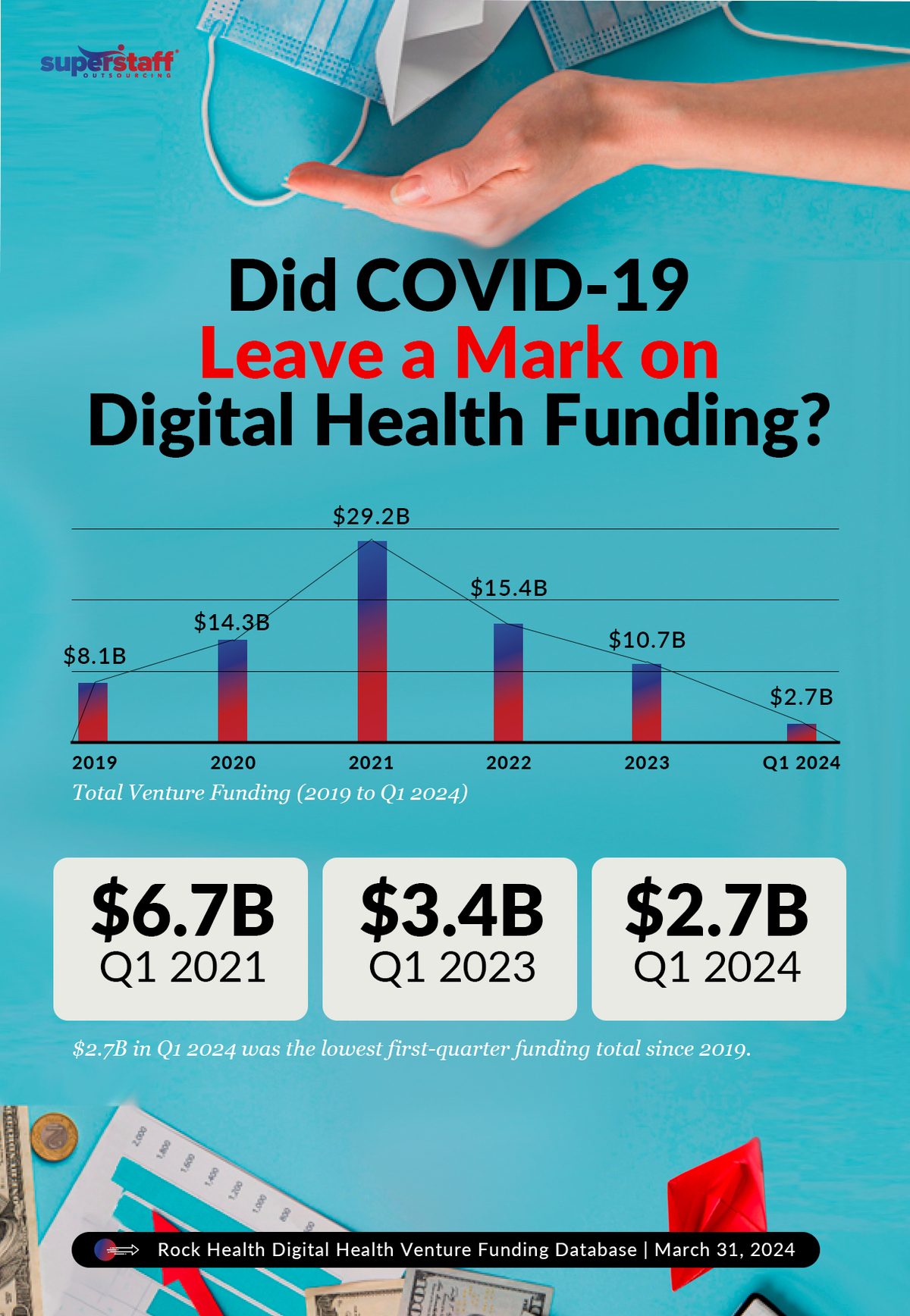
New advancements and innovations are constantly shaping the healthcare ecosystem. As a health tech company, you might be pouring millions of dollars into researching medical devices, software, tools, systems, and other technologies to improve various aspects of the medical landscape.
However, as a health tech startup, you face the challenge of an increasingly competitive industry. Unlike larger companies, you might lack the resources, workforce, and capabilities to quickly scale your operations to meet the growing demand for digital technologies in healthcare.
Fortunately, there’s a way for you to compete with the big players without getting buried in debt: outsourcing to a specialized healthcare BPO. In this article, we’ll explore the challenges, opportunities, and future outlook for health tech startups and how outsourcing can help you tackle your most pressing obstacles.
Health Tech Startups vs. Big Company: What Are the Challenges Faced By Smaller Players?
As healthcare technology rapidly advances, you face increased client demand, regardless of your company’s size. However, tech giants often have a significant advantage over startups, especially when it comes to securing funding and capital for research and development.
The Dominance of Tech Giants in Healthcare Technology
It’s no secret that larger health tech companies have vast resources and established infrastructure, giving them an edge over growing firms like yours. Let’s look at how the Big Four tech giants are each carving out their own spaces in the health tech market:
- Alphabet (Google’s parent company) has been testing and launching a wide range of healthcare products and devices, including utensils for patients with movement disorders, prediction algorithms to help people identify potential illnesses before they manifest, and contact lenses for monitoring glucose levels.
- Apple has been incorporating health apps into its smartphones and smartwatches. These apps allow people to record, collect, and share information about their sleep patterns, physical activities, and other health-related customer data with their medical providers.
- Amazon is investing in telehealth and telemedicine services, which will help the average consumer receive on-demand virtual care or prescription refills without leaving the comfort of their homes.
- Meanwhile, Microsoft is prioritizing the enterprise side of the medical system. Unlike the other tech giants focused on developing products for patients, Microsoft has been creating software and tools that help medical providers improve their processes by streamlining data into an easily accessible cloud-based system.
These powerhouse companies have been investing millions of dollars into the healthcare side of their operations, effectively dominating the competition and making it harder for startups like you to establish a presence.
Limited Budget and Resources for Startups
Many health tech startups like yours face the challenge of securing funding to accelerate research and development. You’ll need to either obtain financing from traditional sources or attract investors, who may perceive your projects as too risky compared to those of larger, established tech companies.
The first quarter of 2024 proved particularly challenging for the digital health sector. A recent study found that the industry secured the lowest amount of funding in over five years, with only $2.7 billion across 133 deals. Compared to the heights of 2021 ($29.2 billion across 738 deals) and 2022 ($15.4 billion across 579 deals), it’s clear that investors are spending less on digital health companies and are becoming more selective and measured in financing startups.
With this smaller funding market, you must work overtime to stand out from the competition. Some smaller companies have managed to attract investors by exploring artificial intelligence tools. The same research highlights that AI-enabled digital healthcare businesses gained 40% of the sector’s total funding for Q1 of 2024, rising from 33% in the previous year.
Another obstacle you might face is navigating regulatory hurdles. Due to the sensitive nature of the healthcare industry, you’ll need to comply with the rules and laws set by regulatory bodies like the International Organization for Standardization (ISO) and the Food and Drug Administration (FDA).
You’ll also need to thoroughly test every new product, device, or medication you develop to ensure its effectiveness and safety for patients.
With numerous demands vying for your full attention, managing core responsibilities alongside critical tasks becomes increasingly challenging. In such scenarios, outsourcing presents itself as a strategic solution to streamline operations and optimize resource allocation.

How Outsourcing Can Position Your Startup for Success
The good news is that despite your health tech startup’s limitations and challenges, you can still improve your competitive edge through outsourcing. By offloading non-core business processes to a third-party provider, you can reduce the workload of your in-house team without sacrificing efficiency and productivity.
This way, you can focus on your company’s core aspects, mainly research and development, and leave the repetitive and time-consuming tasks to outsourced professionals. You can also expand your capabilities by working with offshore or nearshore talent with specialized expertise, all while keeping costs as low as possible.
The Power of Back Office and Customer Service Outsourcing for Health Tech Startups
Here are the advantages of outsourcing customer support, back-office functions, and other BPO solutions for your health tech startup:
Increased Cost-Effectiveness
Developing healthcare technology products can be costly, and you shouldn’t cut corners when creating a high-quality, safe, and effective product for patients and medical providers. Instead, you can reduce operational expenses by delegating non-core tasks to a reliable outsourced service team.
Access to Specialized or Niche Expertise
Finding qualified tech talent can be an uphill battle for many startups. Thankfully, many call centers offer more than customer support services; they can also connect you with software developers, data scientists, AI development support specialists, and other professionals with niche expertise to help accelerate your health tech projects.
Better Scalability and Flexibility
Another advantage of working with a business process outsourcer is scaling your company without disrupting your existing operations. As the health tech landscape rapidly evolves, your BPO partner can give you the flexibility to adapt to fluctuating demands and meet your customers’ needs and preferences.
Improved Focus on Core Competencies
Product development and innovation should be your startup’s main priorities. However, if your in-house team is stuck doing time-consuming tasks like data entry, scheduling, or billing, they won’t be able to focus on their core competencies. Outsourcing back-office support services can free up your staff’s workload and allow them to focus on what they do best.
How Strategic Outsourcing Can Give Smaller Health Tech Startups a Competitive Advantage
With the benefits of outsourcing for your health tech startup now clear, let’s discuss the specific solutions you can offload to a BPO provider. You must approach your outsourcing arrangement strategically to succeed in a competitive health tech landscape.
BPO Customer Service Excellence
Customer success is crucial for all industries but is particularly critical for your healthcare technology company. You must make informed decisions about your medical treatments, and providers must use devices and products effectively to create the best possible outcomes for the patients under their care.
By prioritizing customer care services, your health tech startup can help ensure that patients and providers receive the assistance they need when using a brand-new healthcare application or device and resolve issues whenever they arise. Here are just a few of the functions you can offload to a customer support team:
- Customer Service: Ensure 24/7 availability and responsiveness when addressing customer feedback, problems, and concerns.
- Technical Support and Help Desk: Guide medical providers and patients when navigating your latest health tech devices or applications and help them resolve any technical issues they encounter.
- Multilingual Support: Serve customers worldwide and allow them to communicate with you in their native language.
- Omnichannel Support: Create seamless and efficient customer interactions by integrating support across multiple platforms and channels.
Streamlined Back Office Services
Beyond customer service, you must also pay attention to your non-client-facing functions as a health tech startup. Investing in crucial back-office roles can help drive all other aspects of your operations to maximum productivity and efficiency.
As outsourced professionals handle your administrative and support tasks, your team can prioritize developing healthcare technology products that help better the daily lives of patients and providers. Your back-office team can assist you with regulatory compliance, data security, and implementing cloud-based solutions.
- Data Entry and Management: Ensure all customer information is properly and accurately logged in a secure database.
- Information Technology: Monitor and maintain your tech infrastructure, networks, systems, processes, and devices.
- Accounting and Bookkeeping: Keep an accurate record of all financial transactions and oversee the company’s financial health.
- Billing and Collections: Create and send invoices to ensure timely payments.
- Recruitment: Find and hire qualified professionals to build your health tech team and manage onboarding and other human resources functions.
The Risks of Outsourcing Customer Care and Back Office Support Services and How to Overcome Them
Working with an outsourcing provider can offer you, as a health tech startup, a wealth of advantages and opportunities. However, like any other partnership, it comes with its share of risks and challenges.
Here are some considerations you need to keep in mind when hiring a BPO partner, as well as strategies for addressing potential issues:
Addressing Data Security and Privacy Compliance
You handle much data, including health and medical records, financial transactions, and customer information. As such, when you outsource customer services or any other BPO solution, you must ensure that your third-party provider will keep this data private and secure.
To mitigate security risks, ask your BPO provider about their data protection protocols when drafting your outsourcing agreement. Ideally, your outsourcing partner would comply with ISO standards in data privacy and invest in proven cybersecurity measures.
Managing Cultural Differences
Since you and your BPO provider are located in different countries, you’ll likely encounter cultural and linguistic barriers over the course of your partnership. The most effective way to ensure seamless collaboration is for both parties to make an effort to familiarize themselves with the other’s language, working style, and other cultural differences.
Suppose you’re a U.S.-based health tech firm and want to work with customer service outsourcing companies in the Philippines. In that case, educating yourself on the differences between American vs. Philippine call centers may be beneficial to see how your offshore team handles customer calls and manages conflict resolution, communication, and other issues affecting your working relationship.
Monitoring and Optimizing Outsourcing Performance
Another challenge you may encounter when starting an outsourcing partnership is figuring out how to monitor and optimize the performance of your BPO team. Set relevant KPIs and metrics for your customer services outsourcing team to align expectations as early as the negotiation stage.
Then, set regular meetings with your outsourcing provider where they can give you reports and updates on your team’s progress. This way, you won’t just make assumptions about how your BPO operations are doing; you can review the data and see the results firsthand.

Shaping the Future of Health Tech: Outlook and Opportunities for Customer Service and Back Office Outsourcing
Emerging Trends in Health Tech and Outsourcing
What’s next for you in the health tech industry, and how does outsourcing play a role in shaping your future? Here’s a quick look into a few emerging trends in healthcare technology:
Artificial Intelligence (AI): With the rise of innovations like ChatGPT, medical facilities increasingly seek ways to incorporate AI tools into their daily operations. You will now need further help building AI-enabled software and devices. Smaller tech companies can expand their capabilities and accelerate AI projects through AI development support outsourcing.
Outsourcing healthcare virtual assistant services can help ensure customer satisfaction by facilitating quicker and more seamless telehealth and telemedicine transactions. These offshore professionals can handle data entry, schedule virtual appointments, send and process invoices, and answer patient inquiries.
Healthcare Data Analytics: Data has become increasingly important in the health tech industry. Working with a data science specialist can help you find gaps in existing medical processes that can be optimized through technology or use consumer data to see what products or applications patients would benefit most from utilizing.
Potential Areas to Drive Innovation and Growth
Beyond the above-mentioned emerging trends, you must be vigilant in monitoring potential innovations in the industry. Other potential healthcare tech trends to watch out for include brain implant technologies, AI killer drugs, virtual reality (VR) for healthcare, and gene therapy.
Impact on the Competitiveness of Your Health Tech Startup
A 2023 study found that over 97 health technology unicorns were valued at a combined $229 billion globally, illustrating the lucrative nature of health tech startups. However, the problem is that not all industry players will find success. The same study found that 90% of health tech startups fail in the long run, with 60% falling flat within the first five years.
Here’s the good news: Industry experts predict that the number of failed health tech startups will decrease in the coming years. Leveraging outsourcing for cost-effective solutions and better scalability is one effective way for you to improve competitiveness and achieve sustained growth.
Outsource Customer Service and Other BPO Solutions With SuperStaff
Outsourcing can potentially transform struggling health tech startups into profitable and sustainable enterprises. By embracing BPO solutions as a strategic tool for success, your growing firm can achieve agility and innovation amid a constantly evolving healthcare technology landscape.
If you’re ready to kick-start your outsourcing journey, it’s best to trust reliable providers like SuperStaff to guide you through the process. Our BPO company offers comprehensive and scalable solutions for clients in the healthcare technology sector.
Whether you need help improving your customer experience or optimizing your back-office service solutions, we’ll be with you every step of the way. Contact us today for more information!






